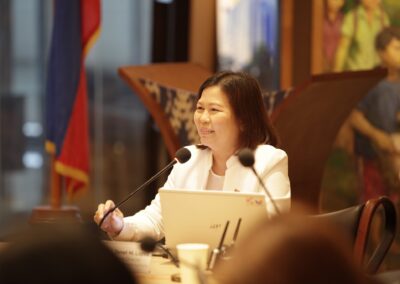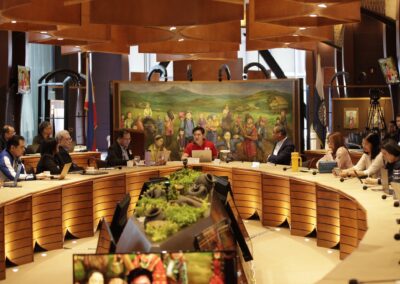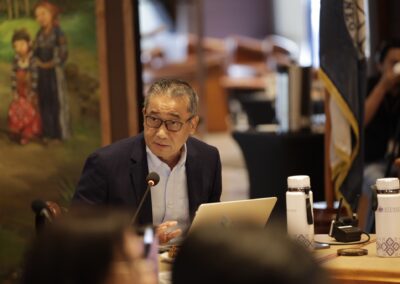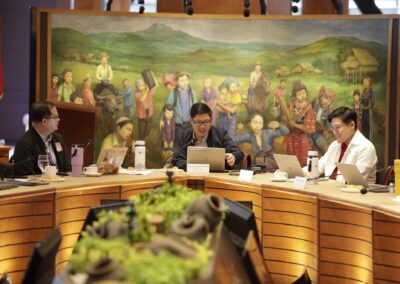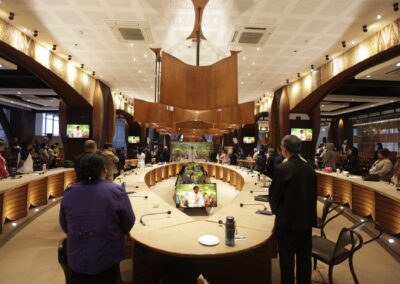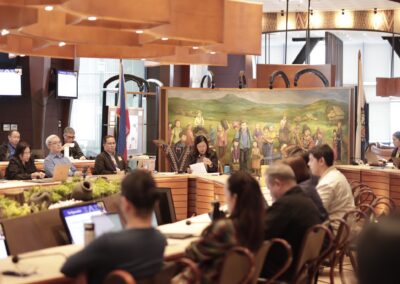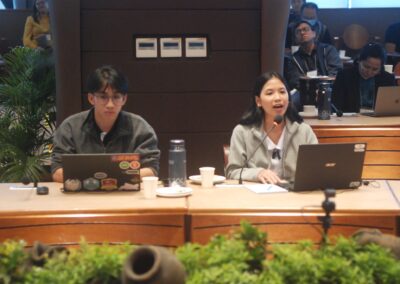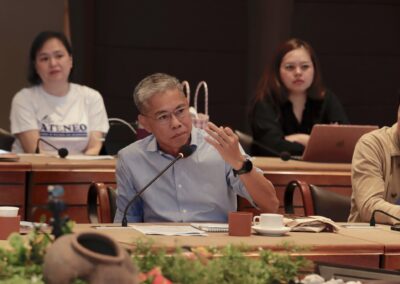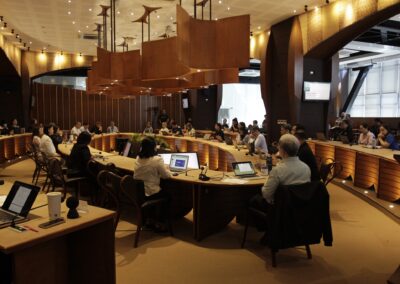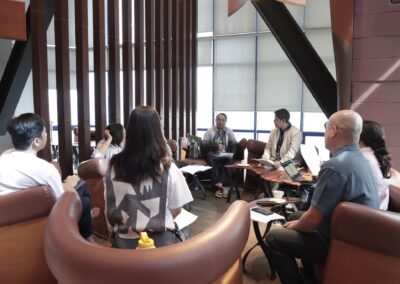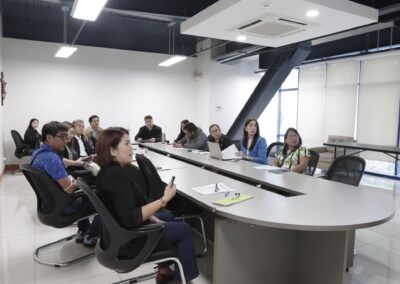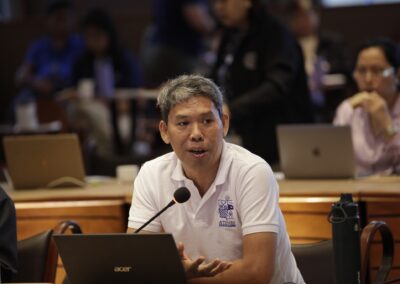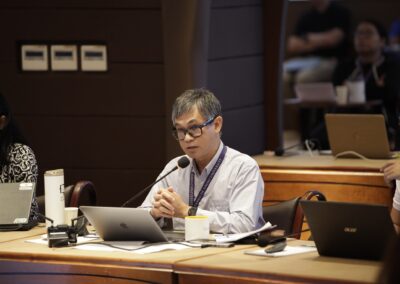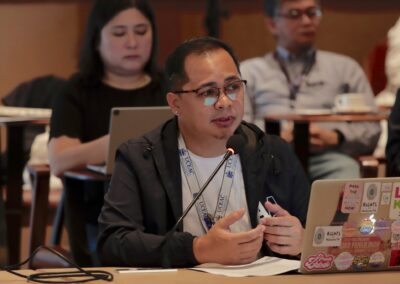As part of its efforts to chart its future direction through Fortiores 2030, Ateneo de Davao University (ADDU) convened two Strategic Planning Conferences held on 23 to 24 January and 26 to 28 February 2025 at the Calungsod–San Vitores Jesuit-Lay Collaboration Center, Community Center of the First Companions. These conferences formed part of the University’s ongoing discernment process with administrators, faculty, staff, students, and trustees.
Through these deeply reflective and participatory processes, the University continues to anchor its journey toward Fortiores in Fide—Stronger in Faith.
First Strategic Planning Conference
Framed by the Jesuit principles of discernment, communal action, and prophetic leadership, the first conference provided a space to reflect on the pressing challenges of the modern world while envisioning a future firmly rooted in ADDU’s Catholic, Jesuit, and Filipino identity.
Over two days, participants reflected on the evaluation of the current strategic plan, 1A1P 2020–2025, and engaged in pakighinabi (conversations) about national, regional, and global contexts led by University President Fr. Karel S. San Juan, SJ, along with co-discussants. The conference was also rich in discussions and insights. Perspectives on the regional context, specifically the Mindanao and Davao situation, were presented by Usec. Janet M. Lopoz, Executive Director of the Mindanao Development Authority (MinDA).
On the following day, participants heard from Dr. Karol Mark Yee, Executive Director of EDCOM II, who examined the current state of Philippine and private education; a session on the future of work, led by Mr. Lito T. Tayag, Trustee of Ateneo de Manila University and former Country Managing Director of Accenture Philippines; and a session on the situation of our youth and students, led by Mr. Jude Manuel SP. Liao, Coordinator of the Jesuit Basic Education Commission (JBEC).
These sessions were complemented by reflections. The spiritual conversations that took place provided a deeply reflective space for participants to process the University’s mission, challenges, and opportunities. These discussions not only engaged with external realities but also turned inward, examining the state of education, the evolving identity of ADDU, and the broader societal role it must embrace in the years leading to 2030.
While recognizing the vast challenges ahead, participants reaffirmed their belief that, together, the University community can achieve far more than individuals acting alone. A collective spirit of discernment guided the conversations, ensuring that ADDU’s strategic direction would not only be pragmatic and future-oriented but also firmly rooted in its Jesuit values.
At the heart of the first conference was the collective effort to shape the University’s renewed vision. This vision is informed by the outputs of group conversations involving staff and student representatives from all units of the University. While still in the process of refinement, these insights provide a strong foundation for aligning ADDU’s mission with its role in serving Mindanao, the Philippines, and the global community.

Second Strategic Planning Conference
Building on the momentum of the first, the second conference focused on identifying the University’s strategic thrusts and articulating the core elements of ADDU’s renewed vision, mission, and goals. Participants revisited the University’s strengths and aspirations and assessed institutional challenges and opportunities.
Aside from summarizing the key points from the first conference, the findings from internal assessments based on strategic planning conversations conducted across various University units in 2024 were also presented. A competitive analysis of the University’s current environment was also comprehensively presented by Mr. Rex T. Rola, Benchmarking and Data Analyst – Office of Strategic Management and Quality Assurance. This was followed by Mr. Jeremy S. Eliab, Executive Vice President, who led a session on design thinking and innovation possibilities.
Participants also engaged in group spiritual conversations to reflect on emerging thematic thrusts. These thrusts, still in the process of refinement and discernment, envision ADDU as a stronger (fortiores) institution. These include: preparing students to work and lead in an increasingly complex world; advancing the University in digitalization, technology, innovation, and internationalization; forming prophetic leaders and citizens through deepened social and community engagement; strengthening the integration of teaching, research, and community involvement; recommitting to ADDU’s mission in and for Mindanao; and institutionalizing synodal, strategic, and spiritual processes—discerning, collaborative, conversational, adaptive, and culturally sensitive.
Throughout the three-day conference, participants upheld ADDU’s commitment to forming ethical, future-ready leaders grounded in Jesuit values. With digital transformation as a core mission driver, participants emphasized the importance of ensuring inclusive access, ethical use of technology, and dynamic innovation between faculty and students. Participants reaffirmed the University’s work in social justice and democratic engagement. They expressed a strong commitment to synergizing teaching, research, and community engagement to generate socially relevant solutions and policy advocacy, with a focus on Mindanao’s socio-economic development. These aspirations, they noted, must be supported by synodal governance rooted in Ignatian spirituality for adaptive, transparent, and data-driven institutional processes, from financial sustainability to leadership succession.
Participants also recognized that partnerships continue to support the advancement of the University’s mission. They articulated the need for the University to further strengthen collaborations with Jesuit institutions, civil society organizations, government agencies, industries, and faith-based networks to enable faculty exchanges, global learning initiatives, advocacy efforts, and resource mobilization.
On the final day of the conference, Fr. Xavier L. Olin, SJ, Jesuit Provincial of the Philippine Province, led the session on the Jesuit mission and apostolic directions, re-anchoring the planning process in the spiritual and institutional mission of the Society of Jesus.
The second conference brought renewed clarity to the University’s identity as a Mindanao-centered institution. This clarity emerged from the outputs of group conversations that reflected a shared commitment to forming transformative leaders for peace, development, and justice. While still evolving, these collective insights continue to reaffirm and guide ADDU’s direction in responding to the needs of Mindanao, the Philippines, and the global community.
As the strategic planning process moves forward, the University is entering its next phases—Collation, Consolidation, Approval, and Commencement—followed by Operational Planning, which will be led by the Office of Strategic Management and Quality Assurance (OSMQA).

Published on

